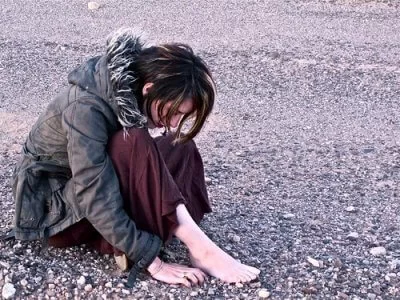Learned Helplessness – Does Life Constantly Overwhelm You?

By: DeeAshley
by Andrea M. Darcy
Tend to feel overwhelmed easily by life? Like things are just beyond you? ‘Learned helplessness’ is a behavioural pattern that can be changed.
What is learned helplessness?
Somewhere along the line in childhood, you learned you couldn’t control things around you, and decided to stop trying to help yourself.
The term comes from a series of rather horrible psychological tests led by American psychologist Martin Seligman [1] in the 1960s, using electric shocks on dogs. The end conclusion being that if a dog suffered repeatedly, in a way that was beyond it’s control, it would then not take an opportunity to escape suffering if one was presented.
Neuroscience later proved it’s not that we ‘accept’ that we are helpless. Rather it’s that we actually learn the behaviour of helplessness as an appropriate reaction to stress.
So learned helplessness means that when we face a stressful situation we can’t control, we have no motivation to change it or take action to deal with it, even when there are things that we could do to help ourselves.
What does learned helplessness look like?
If you suffer from learned helplessness, difficult situations will see you:
- feel overwhelmed
- struggle to make decisions
- become totally passive
- or, alternately, lash out with undue aggression
- give up easily
- not ask for help
- expect the worst
- have negative thoughts such as thinking you don’t deserve better
- attribute things on ‘bad luck’ or blame others.
What does helplessness feel like?
Helplessness actually has several possible physical symptoms, as it tends to be related to childhood trauma and adverse childhood experiences. You might feel:
- exhausted and sleepy
- foggy headed and disconnected
- heavy-limbed
- a headache
- unexplained aches and pains
- like you are catching the flu or a cold.
Why is helplessness a real problem?

By: Zorah Olivia
If we always respond to life challenges with helplessness, it’s going to negatively impact important areas of our lives.
It will make it hard to have healthy relationships. You might be overly dependent on others, or accept staying in an abusive relationship because you feel helpless to leave.
You will struggle to achieve your potential. Helplessness means we don’t go up for job promotions as it feels ‘too stressful’. Or we don’t set big goals as we are sure we’d just never achieve them.
All this adds up to constant low self-esteem and possible mental health issues.
Helplessness and mental health issues
Depression is heavily linked to learned helplessness. Seligman felt that this happens when we attribute our problems to ourselves.
Instead of realising that some of our problems are down to exterior issues — the environments we are in, for example, or the choices of others? We decide that we ourselves are incapable, what he called ‘personal helplessness’. Our self-esteem evidently plummets.
Learned helplessness is also connected to:
- anxiety and social anxiety
- stress
- post-traumatic stress disorder (PTSD).
Why do I feel helpless all the time?
It’s the old ‘environment and genetics’ mix at play. It comes from experiences that we took negative learnings from, and then to the way our brains work.
Learned helplessness is often connected to childhood trauma and adverse childhood experiences (ACEs). Both decimate a child’s sense of relevance and create feelings of total powerlessness.
This does not mean that everyone with a difficult past experiences has learned helplessness. Some of us are naturally more prone to a pessimistic outlook, for example, which makes us more likely to feel helpless. So two siblings who lived through the same difficult domestic situation might grow up with one experiencing helplessness and the other, with an optimistic ‘explanatory style’ about life, not as much.
Can I ever change?
Learned helplessness doesn’t have to be forever. Both changing your lifestyle habits and seeking support can mean improvements and change for you.
A study on animals found that the brain changes made by exercise had an affect on feelings of helplessness.[2]
Rats who ran on wheels were less likely to exhibit learned helplessness, and it wasn’t related to the amount of exercise but to the very act of exercising at all.
No, humans are not rats. But it can’t hurt to integrate physical activity into your weekly routine, particularly with other recent research showing that exercise helps depression.
And any kind of positive self-care can increase your sense of being in charge of yourself and your life. A study published to help nurses deal with patients does show that the more we feel helpless, the less likely we are to take care of ourselves. So each little step counts, whether that is better eating habits, or starting a yoga or mindfulness practice.

By: Walt Stoneburner
Learn how to approach problems from achievable steps first. A goal-setting system like SMART, for example, can help you learn to break down goals into simple steps you can actually achieve.
A 2004 study on American students and test-taking found that those who started with easy questions first did better. If students were presented with difficult questions off the bat, they were more likely to experience helplessness and then not even get easy questions right later. [3]
Can therapy change my pattern of helplessness?
Finally, do consider seeking support. Remember, asking for help is harder for those with the trait of helplessness. But it also means that the very act of gathering your courage and getting support begins to raise your sense of agency and personal power.
All forms of therapy will help you get to the root of your feelings of helplessness, and learn to be more resilient and more in control of your life.
Person-centred counselling and therapies under the humanistic umbrella guide you to see the inner resources you already have, and then put them to work.
Cognitive behavioural therapy (CBT) can help you recognise and change the negative thinking and passive behaviours that uphold your feelings of helplessness. It a particularly good place to start if you suspect your helplessness is connected to childhood trauma. CBT helps you stabilise before you you try other therapies that might otherwise trigger your body’s trauma response.
Other therapies that can help if your helplessness is trauma related can be found in our article, ‘Therapy for Trauma – What Works?‘.
Time to stop feeling helpless and step into your personal power? We connect you with top London psychotherapists and counselling psychologists. Not in the city? Use our booking platform to find a registered online counsellor you can chat with from anywhere.
Want to share you experience of learned helplessness with other readers? Use the comment box below.
 Andrea M. Darcy is a popular health and wellbeing writer who also advises people on finding the right therapist and therapy for them. Find her @am_darcy
Andrea M. Darcy is a popular health and wellbeing writer who also advises people on finding the right therapist and therapy for them. Find her @am_darcy
FOOTNOTES
- Abramson, L. Y., Seligman, M. E. P., & Teasdale, J. D. (1978). Learned helplessness in humans: Critique and reformulation. Journal of Abnormal Psychology, 87, 49-74. doi:10.1037/0021-843X.87.1.49
- Greenwood, B.N., Fleshner, M. Exercise, Learned Helplessness, and the Stress-Resistant Brain. Neuromol Med 10, 81–98 (2008). https://doi.org/10.1007/s12017-008-8029-y
- Firmin, M., Hwang, C., Copella, M., & Clark, S. (2004). Learned helplessness: The effect of failure on test-taking. Education, 124, 688-693.





How do you explain trauma from tragic events many times in your life ?
And when you try to explain it your told , ” I don’t know what you’re talking about ”
From age 3 to 17 there was something that
happen each year making my life more and more confused in till alcohol and drugs were introduced in too my life and that’s when the learned helplessness started , the day I give up and give the controls of powerlessness to make me passive aggressive and depressed.
1973 was the year I smoked hash was opium , I was 13 …
Hi there JP, sounds like you’ve been through a lot and have nobody to talk to. This kind or repeat trauma, if it’s left you with symptoms, that’s now often referred to as ‘complex PTSD’ http://bit.ly/comptrauma. Have you considered seeking help for any of this? We understand if you have learned helplessness makes the process harder, but do try to gather up your courage and reach out for support. Some people find calling a free, confidential, and anonymous helpline a good place to start. We are in the UK, and have a list of free helplines here http://bit.ly/mentalhelplines. Otherwise google for one in your country. We wish your courage. HT.
Might as well link it to ”avoidant personality disorder”. I do not think I have a quality of life. But it is all I know. That is all I can expect from life, from myself. I limited my expectations and try’d to accept it. I disconnected from my emotions. All that is left is a life not really worth living. I accepted therapy for said disorder, but I am running out of life to live. Feel like this ”thing” is going to be my whole life story.
I feel like I’m unable to change and I’ve made myself actually helpless, life doesn’t feel worth it like this